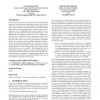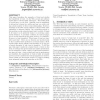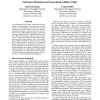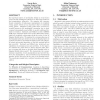666 search results - page 121 / 134 » Modeling Agents with a Theory of Mind |
ATAL
2010
Springer
13 years 8 months ago
2010
Springer
Social laws have proved to be a powerful and theoretically elegant framework for coordination in multi-agent systems. Most existing models of social laws assume that a designer is...
ACMICEC
2006
ACM
14 years 1 months ago
2006
ACM
This paper formalizes the semantics of trust and studies the transitivity of trust. On the Web, people and software agents have to interact with “strangers”. This makes trust ...
AC
2000
Springer
13 years 12 months ago
2000
Springer
In these notes, we give an overview of the join calculus, its semantics, and its equational theory. The join calculus is a language that models distributed and mobile programming. ...
AAAI
2006
13 years 9 months ago
2006
Any automated decision support software must tailor its actions or recommendations to the preferences of different users. Thus it requires some representation of user preferences ...
ATAL
2009
Springer
14 years 2 months ago
2009
Springer
An important aspect of mechanism design in social choice protocols and multiagent systems is to discourage insincere and manipulative behaviour. We examine the computational compl...




